第3章 IN WHICH JOHN REAPS THE WHIRLWIND(1)
ABOUT half-past ten it was John's brave good fortune to offer his arm to Miss Mackenzie, and escort her home. The night was chill and starry; all the way eastward the trees of the different gardens rustled and looked black. Up the stone gully of Leith Walk, when they came to cross it, the breeze made a rush and set the flames of the street-lamps quavering;and when at last they had mounted to the Royal Terrace, where Captain Mackenzie lived, a great salt freshness came in their faces from the sea. These phases of the walk remained written on John's memory, each emphasised by the touch of that light hand on his arm; and behind all these aspects of the nocturnal city he saw, in his mind's-eye, a picture of the lighted drawing-room at home where he had sat talking with Flora; and his father, from the other end, had looked on with a kind and ironical smile. John had read the significance of that smile, which might have escaped a stranger. Mr. Nicholson had remarked his son's entanglement with satisfaction, tinged by humour; and his smile, if it still was a thought contemptuous, had implied consent.
At the captain's door the girl held out her hand, with a certain emphasis; and John took it and kept it a little longer, and said, 'Good-night, Flora, dear,' and was instantly thrown into much fear by his presumption. But she only laughed, ran up the steps, and rang the bell; and while she was waiting for the door to open, kept close in the porch, and talked to him from that point as out of a fortification. She had a knitted shawl over her head; her blue Highland eyes took the light from the neighbouring street-lamp and sparkled; and when the door opened and closed upon her, John felt cruelly alone.
He proceeded slowly back along the terrace in a tender glow;and when he came to Greenside Church, he halted in a doubtful mind. Over the crown of the Calton Hill, to his left, lay the way to Colette's, where Alan would soon be looking for his arrival, and where he would now have no more consented to go than he would have wilfully wallowed in a bog; the touch of the girl's hand on his sleeve, and the kindly light in his father's eyes, both loudly forbidding. But right before him was the way home, which pointed only to bed, a place of little ease for one whose fancy was strung to the lyrical pitch, and whose not very ardent heart was just then tumultuously moved. The hilltop, the cool air of the night, the company of the great monuments, the sight of the city under his feet, with its hills and valleys and crossing files of lamps, drew him by all he had of the poetic, and he turned that way; and by that quite innocent deflection, ripened the crop of his venial errors for the sickle of destiny.
On a seat on the hill above Greenside he sat for perhaps half an hour, looking down upon the lamps of Edinburgh, and up at the lamps of heaven. Wonderful were the resolves he formed;beautiful and kindly were the vistas of future life that sped before him. He uttered to himself the name of Flora in so many touching and dramatic keys, that he became at length fairly melted with tenderness, and could have sung aloud. At that juncture a certain creasing in his greatcoat caught his ear. He put his hand into his pocket, pulled forth the envelope that held the money, and sat stupefied. The Calton Hill, about this period, had an ill name of nights; and to be sitting there with four hundred pounds that did not belong to him was hardly wise. He looked up. There was a man in a very bad hat a little on one side of him, apparently looking at the scenery; from a little on the other a second night-walker was drawing very quietly near. Up jumped John. The envelope fell from his hands; he stooped to get it, and at the same moment both men ran in and closed with him.
A little after, he got to his feet very sore and shaken, the poorer by a purse which contained exactly one penny postage-stamp, by a cambric handkerchief, and by the all-important envelope.
Here was a young man on whom, at the highest point of lovely exaltation, there had fallen a blow too sharp to be supported alone; and not many hundred yards away his greatest friend was sitting at supper - ay, and even expecting him. Was it not in the nature of man that he should run there? He went in quest of sympathy - in quest of that droll article that we all suppose ourselves to want when in a strait, and have agreed to call advice; and he went, besides, with vague but rather splendid expectations of relief. Alan was rich, or would be so when he came of age. By a stroke of the pen he might remedy this misfortune, and avert that dreaded interview with Mr. Nicholson, from which John now shrunk in imagination as the hand draws back from fire.